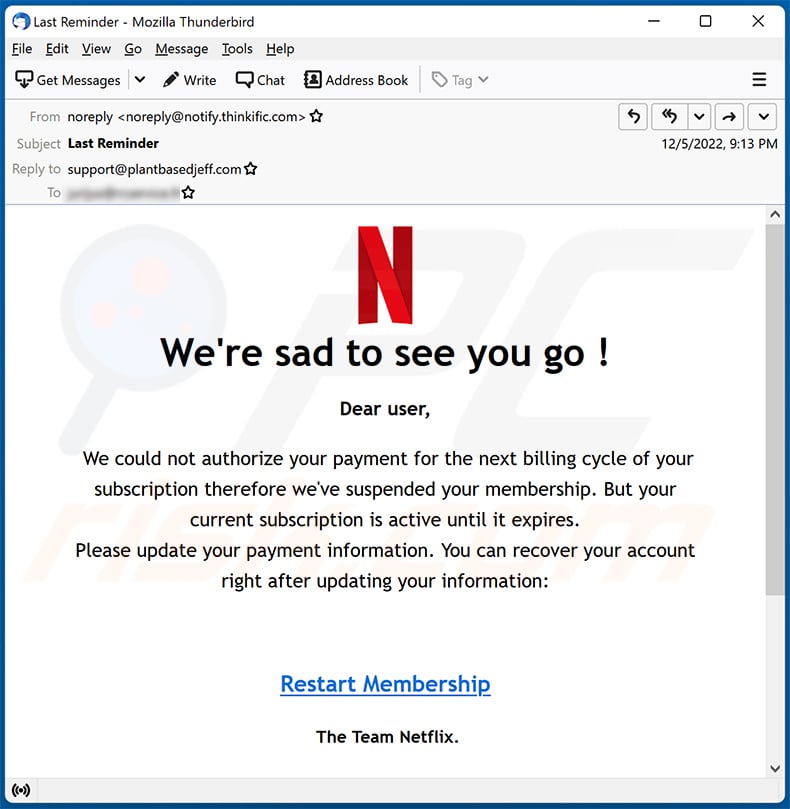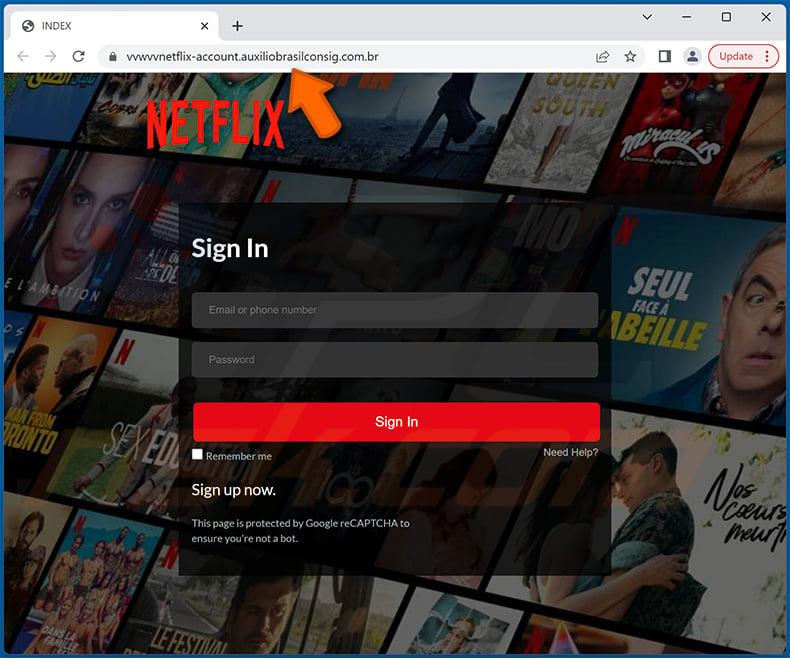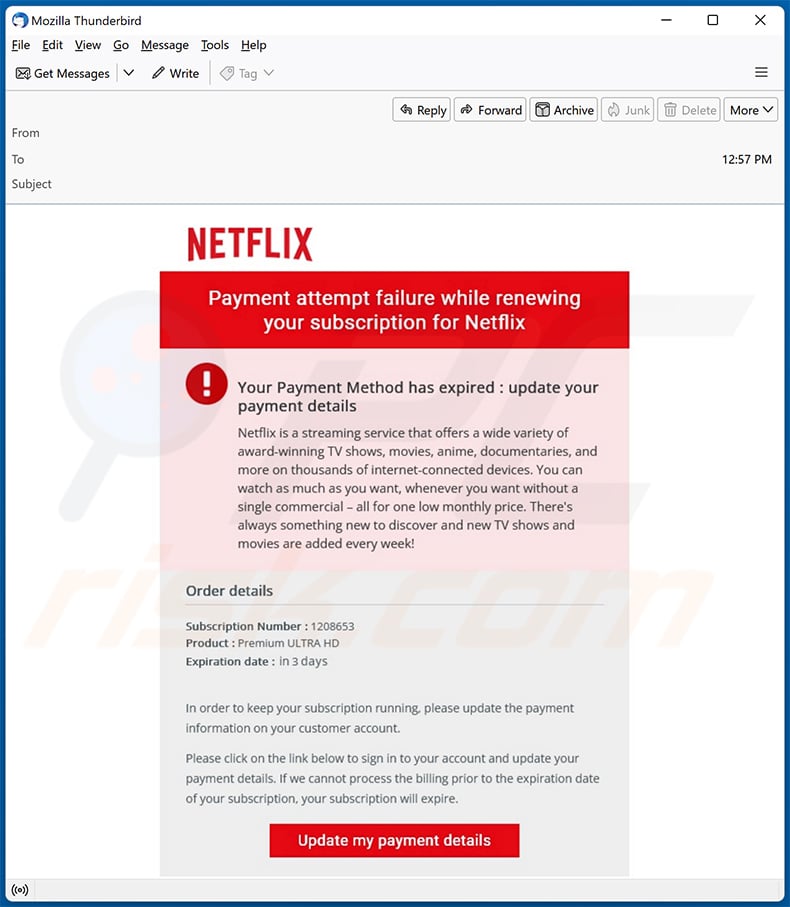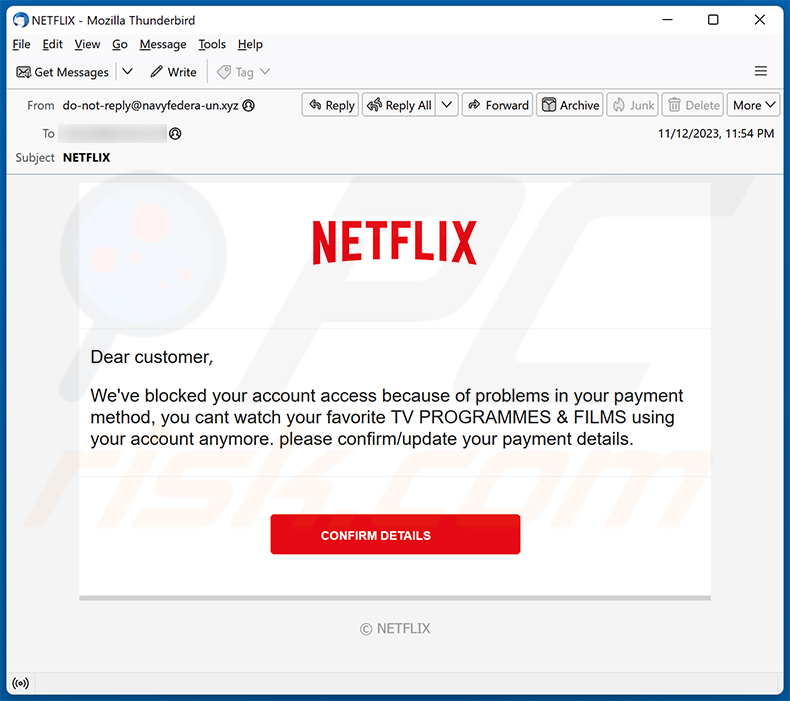Do not trust fake "Netflix - We've Suspended Your Membership" emails
Phishing/ScamAlso Known As: "Netflix - We've Suspended Your Membership" phishing email
Get free scan and check if your device is infected.
Remove it nowTo use full-featured product, you have to purchase a license for Combo Cleaner. Seven days free trial available. Combo Cleaner is owned and operated by RCS LT, the parent company of PCRisk.com.
What kind of email is "Netflix - We've Suspended Your Membership"?
After inspecting the "Netflix - We've Suspended Your Membership" email, we determined that it is fake. This spam letter informs recipients that their Netflix membership has been suspended, and the payment information needs to be renewed to prevent the subscription from expiring. By using these fake claims, the email attempts to trick users into providing their account log-in credentials to a bogus Netflix website.

"Netflix - We've Suspended Your Membership" email scam overview
The spam email with the subject "Last Reminder" (may vary) states that the payment for the next billing cycle of the Netflix subscription could not be authorized. The letter claims that this resulted in the Netflix membership being suspended, but the subscription will supposedly be active until it expires. The user is then encouraged to update their payment information and thus recover their account.
As mentioned in the introduction, this email is not associated with Netflix, and all its claims are false. When we investigated the "Restart Membership" link presented in this spam letter, it redirected to a phishing page disguised as the Netflix website.
The log-in credentials (i.e., email address/ phone number and password) entered into this fake site will be disclosed to the scammers behind this spam campaign.
Should victims of this scam mail have reused their passwords, the cyber criminals could steal that content as well as the Netflix account. Through the phishing website, scammers might acquire telephone numbers that could be sold to third-parties and/or otherwise abused for profit (e.g., scam calls, spam SMSes, etc.).
To summarize, by trusting an email like "Netflix - We've Suspended Your Membership" - users can experience serious privacy issues, financial losses, and even identity theft.
If you have already provided your log-in credentials - immediately change the passwords of all potentially exposed accounts and contact their official support.
| Name | "Netflix - We've Suspended Your Membership" phishing email |
| Threat Type | Phishing, Scam, Social Engineering, Fraud |
| Fake Claim | Next payment for Netflix could not be authorized and due to it - the membership was suspended. |
| Disguise | Netflix |
| Related Domains | auxiliobrasilconsig.com[.]br, web-onlinehome.dedyn[.]io |
| Detection Names (auxiliobrasilconsig.com[.]br) | Combo Cleaner (Phishing), Emsisoft (Phishing), Fortinet (Phishing), Kaspersky (Phishing), Lionic (Phishing), Netcraft (Malicious), Full List Of Detections (VirusTotal) |
| Serving IP Address (auxiliobrasilconsig.com[.]br) | 108.167.151.59 |
| Symptoms | Unauthorized online purchases, changed online account passwords, identity theft, illegal access of the computer. |
| Distribution methods | Deceptive emails, rogue online pop-up ads, search engine poisoning techniques, misspelled domains. |
| Damage | Loss of sensitive private information, monetary loss, identity theft. |
| Malware Removal (Windows) |
To eliminate possible malware infections, scan your computer with legitimate antivirus software. Our security researchers recommend using Combo Cleaner. Download Combo CleanerTo use full-featured product, you have to purchase a license for Combo Cleaner. 7 days free trial available. Combo Cleaner is owned and operated by RCS LT, the parent company of PCRisk.com. |
Phishing spam campaign examples
"New Sign-in With Your Mail Account", "Storage Capacity", "Missed Call", "DHL Shipping Document/Invoice Receipt" - are merely some examples of phishing emails that we have analyzed recently.
These letters are usually disguised as "urgent", "important", "critical", etc. They can even be presented as messages/notifications/warnings from legitimate companies, service providers, institutions, organizations, authorities, and other entities. In addition to various scams, spam emails are also used to proliferate trojans, ransomware, and other malware.
How do spam campaigns infect computers?
Spam emails can have virulent files attached to or linked inside them. These files can be archives (RAR, ZIP, etc.), executables (.exe, .run, etc.), Microsoft Office and PDF documents, JavaScript, and so on.
When an infectious file is executed, run, or otherwise opened - the infection chain (i.e., malware download/installation) is jumpstarted. For example, Microsoft Office documents infect devices by executing malicious macro commands.
How to avoid installation of malware?
We highly recommend exercising caution with incoming emails, PMs/DMs, SMSes, and other messages. The attachments/links present in suspicious or irrelevant mail must not be opened, as they can be malicious and cause infections.
However, malware is not spread exclusively via spam mail. Hence, it is crucial to download from official/verified channels and activate/update software using legitimate functions/tools (as illegal activation ["cracking"] tools and third-party updaters may contain malicious programs).
Another recommendation is to be careful when browsing since illegitimate and dangerous online content usually appears ordinary/harmless.
We must emphasize the importance of having a dependable anti-virus installed and kept updated. Security software must be used to run regular system scans and to remove detected threats. If you've already opened malicious attachments, we recommend running a scan with Combo Cleaner Antivirus for Windows to automatically eliminate infiltrated malware.
Text presented in the "Netflix - We've Suspended Your Membership" spam email letter:
Subject: Last Reminder
We're sad to see you go !
Dear user,
We could not authorize your payment for the next billing cycle of your subscription therefore we've suspended your membership. But your current subscription is active until it expires.
Please update your payment information. You can recover your account right after updating your information:
Restart Membership
The Team Netflix.
2022, Netflix©
Powered by Thinkific
Everything you need to create & deliver courses on your own site
Screenshot of the fake Netflix website promoted by this spam campaign:

Another example of an email from "Netflix - We've Suspended Your Membership" spam campaign:

Text presented within:
NETFLIX
Payment attempt failure while renewing your subscription for NetflixYour Payment Method has expired : update your payment details
Netflix is a streaming service that offers a wide variety of award-winning TV shows, movies, anime, documentaries, and more on thousands of internet-connected devices. You can watch as much as you want, whenever you want without a single commercial - all for one low monthly price. There's always something new to discover and new TV shows and movies are added every week!
Order details
Subscription Number : 1208653
Product : Premium ULTRA HD
Expiration date : in 3 daysIn order to keep your subscription running, please update the payment information on your customer account.
Please click on the link below to sign in to your account and update your payment details. If we cannot process the billing prior to the expiration date of your subscription, your subscription will expire.
Update my payment details
Yet another example of an email from Netflix membership suspension-themed spam campaign:

Text presented within:
Subject: NETFLIX
NETFLIX
Dear customer,
We've blocked your account access because of problems in your payment method, you cant watch your favorite TV PROGRAMMES & FILMS using your account anymore. please confirm/update your payment details.Confirm details
© NETFLIX
Instant automatic malware removal:
Manual threat removal might be a lengthy and complicated process that requires advanced IT skills. Combo Cleaner is a professional automatic malware removal tool that is recommended to get rid of malware. Download it by clicking the button below:
DOWNLOAD Combo CleanerBy downloading any software listed on this website you agree to our Privacy Policy and Terms of Use. To use full-featured product, you have to purchase a license for Combo Cleaner. 7 days free trial available. Combo Cleaner is owned and operated by RCS LT, the parent company of PCRisk.com.
Quick menu:
- What is "Netflix - We've Suspended Your Membership" phishing email?
- Types of malicious emails.
- How to spot a malicious email?
- What to do if you fell for an email scam?
Types of malicious emails:
![]() Phishing Emails
Phishing Emails
Most commonly, cybercriminals use deceptive emails to trick Internet users into giving away their sensitive private information, for example, login information for various online services, email accounts, or online banking information.
Such attacks are called phishing. In a phishing attack, cybercriminals usually send an email message with some popular service logo (for example, Microsoft, DHL, Amazon, Netflix), create urgency (wrong shipping address, expired password, etc.), and place a link which they hope their potential victims will click on.
After clicking the link presented in such email message, victims are redirected to a fake website that looks identical or extremely similar to the original one. Victims are then asked to enter their password, credit card details, or some other information that gets stolen by cybercriminals.
![]() Emails with Malicious Attachments
Emails with Malicious Attachments
Another popular attack vector is email spam with malicious attachments that infect users' computers with malware. Malicious attachments usually carry trojans that are capable of stealing passwords, banking information, and other sensitive information.
In such attacks, cybercriminals' main goal is to trick their potential victims into opening an infected email attachment. To achieve this goal, email messages usually talk about recently received invoices, faxes, or voice messages.
If a potential victim falls for the lure and opens the attachment, their computers get infected, and cybercriminals can collect a lot of sensitive information.
While it's a more complicated method to steal personal information (spam filters and antivirus programs usually detect such attempts), if successful, cybercriminals can get a much wider array of data and can collect information for a long period of time.
![]() Sextortion Emails
Sextortion Emails
This is a type of phishing. In this case, users receive an email claiming that a cybercriminal could access the webcam of the potential victim and has a video recording of one's masturbation.
To get rid of the video, victims are asked to pay a ransom (usually using Bitcoin or another cryptocurrency). Nevertheless, all of these claims are false - users who receive such emails should ignore and delete them.
How to spot a malicious email?
While cyber criminals try to make their lure emails look trustworthy, here are some things that you should look for when trying to spot a phishing email:
- Check the sender's ("from") email address: Hover your mouse over the "from" address and check if it's legitimate. For example, if you received an email from Microsoft, be sure to check if the email address is @microsoft.com and not something suspicious like @m1crosoft.com, @microsfot.com, @account-security-noreply.com, etc.
- Check for generic greetings: If the greeting in the email is "Dear user", "Dear @youremail.com", "Dear valued customer", this should raise suspiciousness. Most commonly, companies call you by your name. Lack of this information could signal a phishing attempt.
- Check the links in the email: Hover your mouse over the link presented in the email, if the link that appears seems suspicious, don't click it. For example, if you received an email from Microsoft and the link in the email shows that it will go to firebasestorage.googleapis.com/v0... you shouldn't trust it. It's best not to click any links in the emails but to visit the company website that sent you the email in the first place.
- Don't blindly trust email attachments: Most commonly, legitimate companies will ask you to log in to their website and to view any documents there; if you received an email with an attachment, it's a good idea to scan it with an antivirus application. Infected email attachments are a common attack vector used by cybercriminals.
To minimise the risk of opening phishing and malicious emails we recommend using Combo Cleaner Antivirus for Windows.
Example of a spam email:

What to do if you fell for an email scam?
- If you clicked on a link in a phishing email and entered your password - be sure to change your password as soon as possible. Usually, cybercriminals collect stolen credentials and then sell them to other groups that use them for malicious purposes. If you change your password in a timely manner, there's a chance that criminals won't have enough time to do any damage.
- If you entered your credit card information - contact your bank as soon as possible and explain the situation. There's a good chance that you will need to cancel your compromised credit card and get a new one.
- If you see any signs of identity theft - you should immediately contact the Federal Trade Commission. This institution will collect information about your situation and create a personal recovery plan.
- If you opened a malicious attachment - your computer is probably infected, you should scan it with a reputable antivirus application. For this purpose, we recommend using Combo Cleaner Antivirus for Windows.
- Help other Internet users - report phishing emails to Anti-Phishing Working Group, FBI’s Internet Crime Complaint Center, National Fraud Information Center and U.S. Department of Justice.
Frequently Asked Questions (FAQ)
Why did I receive this email?
Spam emails are not personal. Cyber criminals distribute this mail by the thousand with the hopes that at least some recipients will fall for their scams.
I have provided my personal information when tricked by this spam email, what should I do?
If you've provided account log-in credentials - change the passwords of all possibly compromised accounts and contact their official support without delay. And if you have disclosed private data (e.g., ID card details, credit card numbers, etc.) - immediately contact the appropriate authorities.
I have read a spam email but didn't open the attachment, is my computer infected?
No, merely opening a spam email will not initiate any system infection processes. Devices are infected when the attachments or links present in malicious spam emails are opened/clicked.
I have downloaded and opened a file attached to a spam email, is my computer infected?
If it was an executable (.exe, .run, etc.) - most likely, yes - your system was infected. However, documents (.doc, .xls, .pdf, etc.) may need additional user interaction (e.g., enabling macro commands) to initiate the infection chains.
Will Combo Cleaner remove malware infections present in email attachments?
Yes, Combo Cleaner is capable of detecting and eliminating practically all known malware infections. It is noteworthy that sophisticated malicious software typically hides deep within systems - hence, performing a complete system scan is paramount.
Share:

Tomas Meskauskas
Expert security researcher, professional malware analyst
I am passionate about computer security and technology. I have an experience of over 10 years working in various companies related to computer technical issue solving and Internet security. I have been working as an author and editor for pcrisk.com since 2010. Follow me on Twitter and LinkedIn to stay informed about the latest online security threats.
PCrisk security portal is brought by a company RCS LT.
Joined forces of security researchers help educate computer users about the latest online security threats. More information about the company RCS LT.
Our malware removal guides are free. However, if you want to support us you can send us a donation.
DonatePCrisk security portal is brought by a company RCS LT.
Joined forces of security researchers help educate computer users about the latest online security threats. More information about the company RCS LT.
Our malware removal guides are free. However, if you want to support us you can send us a donation.
Donate
▼ Show Discussion